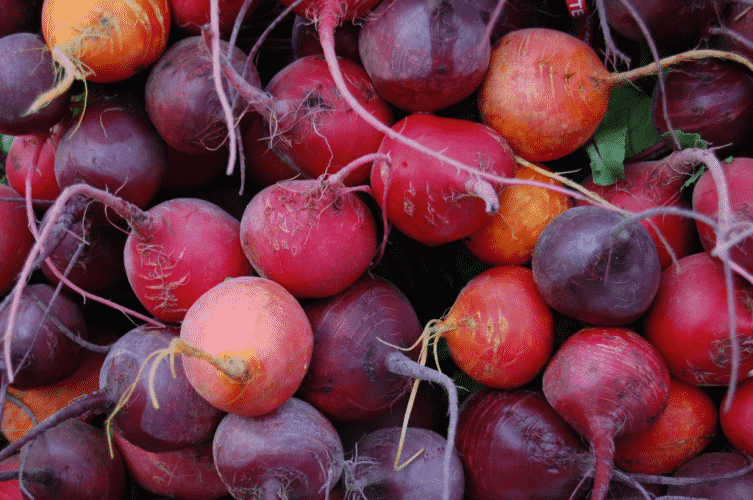Beets are a highly nutritious root vegetable that contains unique pigment antioxidants. Beware: it will stain anything it comes in contact with. Beets are known for their high sugar content that is processed to make beet sugar.
Disease/Ailment:
Cardiovascular disease
Birth defects
Colon cancer
Chronic inflammation
Health benefits:
Anti-inflammatory: The phytochemicals betanin, isobetanin, and vulgaxanthin contribute to the anti-inflammatory properties of beets. They inhibit the activity of certain enzymes that are used by cells to produce messaging molecules that trigger inflammation.
Antioxidant: Beets have an unusual mix of antioxidant phytonutrients, which give them their distinct color. In addition to vitamin C and manganese, the betalain phytonutrients provide antioxidant support different from other antioxidant-rich vegetables.
Detoxification: The betalin pigments in beets have been shown to support activity for the detoxification phase in which cells attach to toxins and neutralizes them making them sufficiently water-soluble for excretion in the urine.
Good source of:
Folate, manganese, vitamin C, potassium
Purchasing, storing, and enjoying:
Purchasing: Choose small or medium-sized beets whose roots are firm, smooth-skinned and deep in color. For smaller, younger beets, they may be so tender that they don’t need to be peeled after they are cooked. Avoid beets that show any sign of spoilage.
Storing: Cut the majority of the greens so that the moisture is not pulled out of the root. Store the unwashed beets in a separate, airtight bag in the refrigerator where they will keep for up to three weeks. Raw beets do not freeze well but cooked beets will retain their flavor and texture well.
Enjoying:
- Include grated beets as a colorful addition to salads or a garnish to soups.
- Beets can be boiled, roasted, or grilled and added to soups, entrees, and salads.
- Canned beets are a quick option when using beets in a recipe.
- The leaves of the root can also be eaten fresh or boiled or prepared similarly to spinach or Swish chard.
Caution: Some may notice a reddish tint to their urine known as “beeturia”. This condition is due to the betacyanin content in beets and is not harmful. Beets will stain your fingers and clothes so wear gloves and an apron.
Resources and recipes:
Roasted beets: http://low-cholesterol.food.com/recipe/bobby-flays-roasted-beets-for-recipes-370885
Beetballs: http://blog.fatfreevegan.com/2012/02/beetballs-a-vegan-gluten-free-soy-free-sausage-recipe.html
References:
Bobek P, Galbavy S, Mariassyova M. The effect of red beet (Beta vulgaris var. rubra) fiber on alimentary hypercholesterolemia and chemically induced colon carcinogenesis in rats. Nahrung 2000 Jun;44(3):184-7. 2000.
Lee CH, Wettasinghe M, Bolling BW et al. Betalains, phase II enzyme-inducing components from red beetroot (Beta vulgaris L.) extracts. Nutr Cancer. 2005;53(1):91-103. 2005.
Lucarini M, Lanzi S, D’Evoli L et al. Intake of vitamin A and carotenoids from the Italian population–results of an Italian total diet study. Int J Vitam Nutr Res. 2006 May;76(3):103-9. 2006.
Song W, Derito CM, Liu MK et al. Cellular antioxidant activity of common vegetables. J Agric Food Chem. 2010 Jun 9;58(11):6621-9. 2010.

